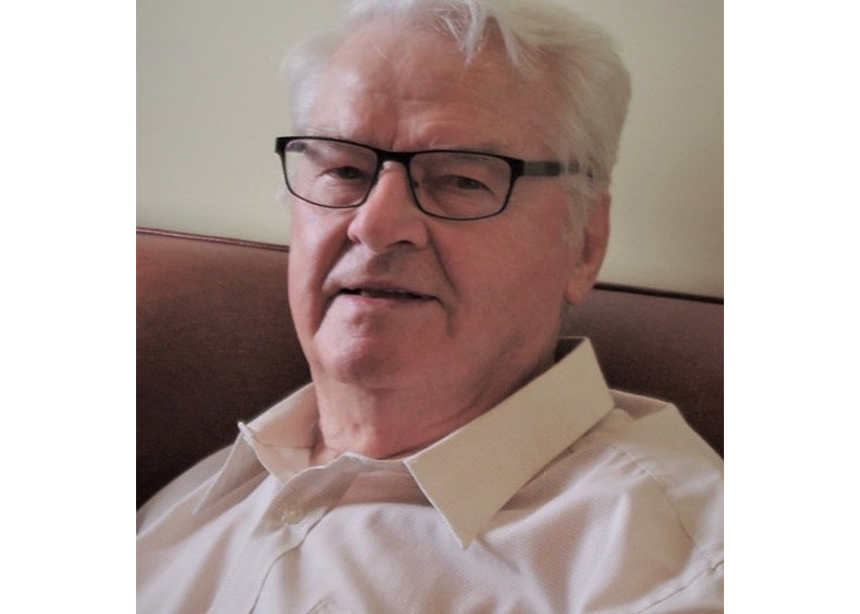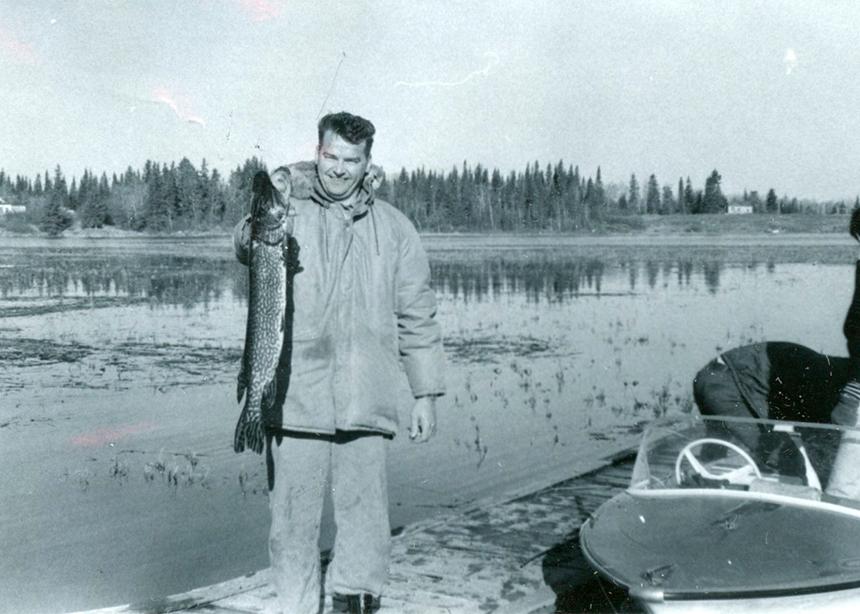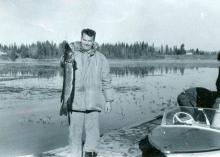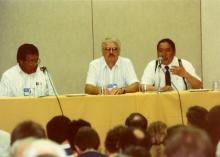Menno Wiebe, who died on Jan. 5 at his home in Winnipeg, was highly respected in Mennonite circles and beyond for his work and relationships with Indigenous Peoples.
While reporting for his tribute to Wiebe, senior writer Will Braun collected the following remembrances from a handful of the people who knew him.
Edgy attire
I remember Menno as a character with presence. You knew when he was in the room. That was literally true for my spouse when she worked for Mennonite Central Committee in one of the many cubicles at 134 Plaza Dr. in Winnipeg in the 1990s. She remembers Menno often standing to take phone calls, thereby enabling everyone within earshot to hear his side of the conversation.
A friend shared with me that she had been a fellow idealist who joined Menno’s campaign of resistance against the introduction of computers to Winnipeg’s MCC offices in the 1980s. People, not machines, were MCC’s greatest asset!
I likely met Menno at my parents’ dining table when I was a boy, but it was when he showed up at Columbia Bible College in late 1979 that his real impact on my life began. I perceived him as a rock star of justice. Big voice. Edgy ideas. Colourful clothing that spoke of his connection to peoples that I had met only indirectly.
Twenty years and many collegial encounters later, I took a position at MCC Canada in the wake of Menno’s departure. Despite his misgivings about MCC’s direction, he was gracious. We met for lunch many times, which always left me inspired and often chuckling. When we asked him to join meetings between MCC and leaders of Pimicikamak Cree Nation, Menno magically turned meetings into what felt more like family gatherings.
Rick Zerbe Cornelsen is the former Aboriginal Neighbours network coordinator with Mennonite Central Committee Canada.
Cattle onboard
During the years that I knew Menno, I met him in a variety of roles: as a visiting speaker at Swift Current Bible Institute, as an anthropology professor at Canadian Mennonite Bible College, as a supporter of my work with the Mennonite Church around Indigenous issues, and as my friend. Each one of these roles and experiences comes with rich stories of interaction with Menno.
One of the most unforgettable experiences took place in the late spring of 1976. Menno had heard that Mennonite dairy farmers could not sell their bull calves and were considering killing them rather than feeding them throughout the winter. He encouraged farmers to take care of them until the spring and at the same time arranged for the communities of Bloodvein and Berens River [First Nations on the east side of Lake Winnipeg in Manitoba] to take and raise them.
The calves were brought from Osler, Sask. and Winkler, Man. to the end of the road and loaded onto boats. I was there when they were unloaded from the trailers, wrestled to the ground, feet tied crossways, a pole stuck between their legs, and loaded on to the boats and then taken across Lake Winnipeg.
The communities also invited Mennonite farmers to join them in a fall butchering bee. Menno had a dream that both communities would benefit from this experience. Both communities trusted Menno's leading. He provided a bridge for them to come together to build relationships, to learn from one another and have fun doing it!
I am grateful to Menno for the faith, vision, courage and commitment that he brought to his life’s work. He was an ambassador of peace, goodwill and reconciliation whose work we continue to build on. We stand on the shoulders of giants like Menno, and his spirit still walks with and guides us today.
Leonard Doell retired last June after 24 years as Native Concerns program coordinator at Mennonite Central Committee Saskatchewan.
Rock garden
We are forever grateful to Menno Wiebe for seeing something in a young couple in fall 1967 and offering us our first introduction to living in an Indigenous community—at Bloodvein River First Nation over the Christmas break and the following summer, and then as full-time Native Ministries staff at Manigotagan in 1969. In later years we would tease Menno that he is the reason we joined Native Ministries and stayed so long. He would just smile and say, “Good!”
Menno knew the importance of listening to—and learning from—the elders, so he connected us with Cree elder, Rev. Adam Cuthand, before our move to Manigotagan. One thing that we remembered clearly was his story of graves eroding into the river and causing much concern to the people. Later, Neill was able to help the community shore up the land and solve that problem. Community was especially important to Menno and he revelled in playing hockey with the Manigotagan fellows and other interactions.
We always felt Menno’s support and encouragement, and his visits always inspired us to carry on with vision. He saw the importance of becoming a part of the community one lived in. He even got permission from conference leadership for Neill to serve as the first mayor of the community of Manigotagan and help the community set up their government system, mentor young leaders, and develop a stronger pride in their Métis and First Nations heritage.
Neill caught a ride to Winnipeg with Menno after an evening event he attended with us. The men were still an hour north of Winnipeg when the car started losing power. Thankfully, there was a night attendant on duty at the gravel pit yard they managed to get the car into before it died. By now it was almost midnight, so the battery charged while the men visited with the attendant. They were several blocks from Menno’s home when the battery died again so they put the small Vauxhall car in neutral and pushed it to the house. The next morning Neill discovered that Menno had filled the trunk with rocks he found in Manigotagan for the rock garden he was making in Winnipeg. No wonder the small car was so heavy to push!
Menno was a visionary and, in many respects, a prophet and a man before his time. Society and the larger church denomination were usually not ready to hear his words or understand his action. He was a remarkable man for his breadth of knowledge, his vision for the larger church, the connections he nourished and his mentorship of many people.
Neill and Edith von Gunten are retired Mennonite Church Canada Native Ministries workers.
Beans
For years, Menno led an orientation in Winnipeg for what was called the MCC Native Gardening program. In my year, 1981, on the grounds of what is now Canadian Mennonite University, we shovelled away snow from the soil so our group could practice using the rototiller!
By the early ‘90s, as I directed Native Concerns in MCC Ontario, I took Menno to visit new friends I was making among Haudenosaunee at the Six Nations of the Grand River. These were the original farmers, growing the Three Sisters—corn, beans and squash—long before Europeans arrived. Menno loved it. His twin passions for gardening and for just relations with Indigenous peoples were both fed abundantly. It wasn’t long until the idea emerged that the orientation for those volunteers going off to garden on reserves across Canada should move to Six Nations, where in early May the soil is warm and the growing season is underway.
Menno developed a special friendship with Iowne, matriarch of the fields at Six Nations. Through her network not only did the gardening orientation flourish in her community, but she hosted gardeners for several summers in her home. They helped her continue her dream of fostering a renewed interest in food production among her people, including saving seeds handed down from season to season.
More years passed and Menno invited Iowne to his retirement party. Iowne brought a gift, a small package of Trail of Tears beans. These seeds had been saved for generations and were named for the deadly 1830s journey westward that resulted from the expulsion of thousands of Indigenous people from the eastern U.S. Iowne’s clear expectation of Menno the gardener was continued propagation of his gift.
Several more decades passed, and I paid a visit two summers ago to my former colleague and his spouse, Lydia. While Menno was not highly communicative, with Lydia’s help I was able to convey my thanks for his influence in MCC, in building just relationships between first people and Anabaptist people, and in shaping me. I was gifted with a margarine container of black beans. We planted, harvested and just a few weeks ago, we ate our first chili made with the next generation of Trail of Tears beans. I have already had a request from a colleague to whom I will send a few handfuls for the coming planting season.
Thank you, Menno, for the part you played in relentlessly insisting that relationships with those who welcomed us here are primary and need our deepest, most just attention.
And thanks for the beans.
Rick Cober Bauman is the executive director of Mennonite Central Committee Canada.
Listen to the poplars
Every spring, I have Menno’s voice in my ear: “You know it’s time to plant potatoes when the leaves on the poplar leaves are the size of nickels. You can trust them to tell you because a poplar tree never lies.”
There was poetry in this teaching and a philosophy, too. Menno once told me that “if you don’t equate truth and the gospel with being white, if you take time and show an interest, [Indigenous people] will share things that have not crossed the mind of Aristotle or any western thinker.” Chief among these for Menno was that “we are linked laterally to the creation, not vertically.” This, he told me, is why [Indigenous organizer] Milton Born With A Tooth would ask, “Who will stand up for the river?”
And it’s why Menno would ask the poplar trees when it was time to plant potatoes. It’s a family matter. We are paying proper attention to our relatives. That’s why we listen to those voices that speak to us without words.
Thank you for listening, Menno, and for passing on what you heard. Your magnificent voice has passed into the silence that is the language that God speaks.
I'll try to keep listening.
Marcus Rempel is an author and farmer at Ploughshares Community Farm in Beausejour, Man.
My friend
I feel like a great tree fell in the forest and I heard it fall. The tree was so unique and special that I could not speak. I could not say to anyone what I heard, what I felt about this tree. My professional life has been all about words. My original Cree-speaking Métis culture and language was all about words. And yet, here I have been bereft of words.
For weeks now since Menno Wiebe passed, I have not really been able to express everything he meant and will always mean to me. I first met Menno at a large Mennonite conference in Minneapolis in 1972. I was in my early 20s and he was barely 40. We became instant colleagues with dreams to change the world, particularly for Indigenous peoples of North America.

In 1976 we connected again. This time he was Director of Native Concerns for Mennonite Central Committee Canada in Winnipeg, and I was a graduate student at the University of Manitoba. He hired me to be a “peace observer” in Kenora, Ont., a Canadian town known for its troubling treatment of local Anishnaabe peoples who in 1975 occupied a park in an effort to regain it and to bring attention to their socio-economic concerns. It was a summer job that I think Menno kindly generated for me. This was the beginning of a lifelong connection not only as colleagues in idealism and activism for human and Indigenous rights but as friends. That friendship eventually extended to meeting each other’s families, a friendship that will remain special forever.
Throughout the late 1970s and some of the ‘80s, Menno and I travelled together to church conferences and workshops. He was an anthropologist with a Master of Arts and I was a young historian. We spent hours discussing issues that ranged from social to theological, sometimes passionately disagreeing. But always friends.
What I learned about Menno was that he loved to laugh and be with people, and he seemed to have a special gift with young people. His heart though was with Indigenous peoples; he spent a good portion of his life educating, advocating and often agonizing on their behalf. He had a prophetic understanding of the Indigenous struggle for justice, land reclamation and decolonization.
But what stands out is that he was not just any distant ally—he made every effort to know the people. Whether he was joining a protest in northern Alberta, or exposing the damage done to Native lands and communities by Manitoba Hydro, or appearing in courts in support of land claims, he always made it personal. To him, Indigenous peoples were not just statistics or news items. They were his friends. He laughed with them; gardened beside them; fished and hunted with them; and listened to their stories, which he often put into poetry. He served as their minister and he suffered when they suffered. Menno had a profound respect for Indigenous peoples and cultures.
Menno was always humble about his work but I felt he deserved much more public recognition. Not only had he dedicated his life to social justice, but he was an incredibly knowledgeable man. His knowledge extended from local to international history, from Western to Indigenous histories on a global scale. And of course he knew his personal Christian/Mennonite/Anabaptist history, and he certainly knew his Bible and his theology.
He was also a poet and a horticulturalist. He was no ordinary gardener. He knew exactly where his onions, his potatoes or his melons came from—some from Russia, where he had visited in honour of his and his wife Lydia’s Russian Mennonite background. He not only loved land, he knew the ecology of it.
A person with such vast knowledge and dedication deserved distinction. Sometime in the 2000s, I started a campaign to get him an honorary doctorate. My University of Manitoba department did not have a doctoral program then, so I approached a colleague with some influence at the university’s St. John’s College to confer Menno with an honorary doctorate. On Nov. 1, 2009 Menno was acknowledged with an honorary doctorate for his lifetime dedication to service and knowledge.
I will miss my friend; it was a privilege to know such a gifted and extraordinary human being. Whether as a friend or advocate, Menno practiced his faith and modeled Anabaptism. The Mennonite Church was blessed to have had such a visionary son.
Dr. Emma LaRocque is a professor of Native Studies at the University of Manitoba.
This article was updated on Feb. 1 to include Emma LaRocque’s tribute.
Related story:
A tribute to Menno Wiebe (1932-2021)





Comments
It's hard to express in words the depth of appreciation and affection which I feel for Menno. So much of what I now believe about life, about others, about myself and about the natural world have their origin in my friendship with him. Without his guidance I would not have had the 24 year privilege of being the Indigenous Coordinator for MCCBC.
I recall with fondness the many pilgrimages throughout B.C. that we undertook together. Menno, far better than I, always seemed to have a way of bridging relationships between people.
I remember in particular one trip we made to an interior indigenous community which had told me in no uncertain terms that if we were church related, not to bother coming for a visit. Nevertheless with apprehension, at least on my part, we tried. I recall vividly the dirt road into the community through absolutely staggeringly beautiful country. On our arrival I was relieved to have Menno's broad shoulders and irresistible personality on my side. Menno, true to form had a gift of wild rice from the plains Ojibway for the lady chief. It wasn't long before the ice had melted and at the end of our unannounced meeting we received the most gracious initiation to return and to consider sending volunteers into the community for the summer. All of this led to one of the longest and warmest relationships between the Secwepemc and Mennonite people.
Others have said it better than I, but the breadth and depth of Menno's understanding of many other, and seemingly unrelated topics was truly impressive. He was no 'one issue' man. He was a true Human Being, a true Mensch.
Darryl Klassen
I met Menno Wiebe in 1984 at the MWC in Strasbourg/France. I was a German young adult volunteer with a purple dyed diaper as a scarf, which was the sign of the volunteers. The first day of the conference, I was sitting at the registration table. Most of the people who came to register were North Americans, Menno was one of them. Realizing we shared the same last Name, made us instantly friends, maybe we could even be related?
Menno and I met every day in some way. He was in the line where I handed out food, or we just met walking to an event. On Sunday, the last day he asked me where he could buy a purple scarf? I told him that we all made our own, but he could have mine and I handed it to him. In reply he gave me a business card and told me that if I ever wanted to come to Canada, he would help me. I took it and kept it, never thinking to use it. I hated English in School.
In fall of 1986, a young Canadian made me want to come and check out Manitoba. I contacted Menno as he had promised to help me. In August of 1987 I arrived in Winnipeg for a 2 year voluntary service. I ended up staying in Winnipeg. Whenever Menno and I met, there was this friendship and connection, which started at at Mennonite World Conference. I will be thankful for the rest of my life to have met this friendly, warm person, who viewed every human being as a person to love and respect.
Add new comment
Canadian Mennonite invites comments and encourages constructive discussion about our content. Actual full names (first and last) are required. Comments are moderated and may be edited. They will not appear online until approved and will be posted during business hours. Some comments may be reproduced in print.